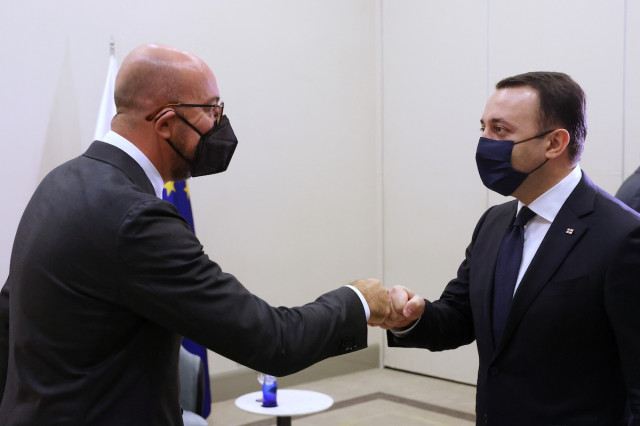 Ukraine reports 5,276 new COVID-19 cases
Ukraine reports 5,276 new COVID-19 cases
 Zelensky: Every third Ukrainian considers road construction one of greatest achievements of 2021
Zelensky: Every third Ukrainian considers road construction one of greatest achievements of 2021
 Ukraine ready to implement Minsk agreements, but Russia's desire needed - Yermak
Ukraine ready to implement Minsk agreements, but Russia's desire needed - Yermak
 Michel: EU unanimously agree to roll over economic sanctions against Russia
Michel: EU unanimously agree to roll over economic sanctions against Russia
 Actions by Ukraine's partners will help prevent worst-case scenario - Zelensky
Actions by Ukraine's partners will help prevent worst-case scenario - Zelensky
 COVID-19 in Ukraine: Health officials confirm 8,899 daily cases as of Dec 17
COVID-19 in Ukraine: Health officials confirm 8,899 daily cases as of Dec 17
 Macron tells Zelensky he declared support for Ukraine in call with Putin
Macron tells Zelensky he declared support for Ukraine in call with Putin
 Zelensky, Scholz discuss gas transit through Ukraine after 2024
Zelensky, Scholz discuss gas transit through Ukraine after 2024
 Ukraine ready for any format of talks with Russia - Zelensky
Ukraine ready for any format of talks with Russia - Zelensky
 Ukraine’s only journalist in Russia facing extremism charges - lawyer
Ukraine’s only journalist in Russia facing extremism charges - lawyer
 PM Shmyhal: First two applications for investment projects worth $96 million filed
PM Shmyhal: First two applications for investment projects worth $96 million filed
 Zelensky, PM of Italy discuss security situation around Ukraine
Zelensky, PM of Italy discuss security situation around Ukraine
 President signs off State Budget 2022
President signs off State Budget 2022
 London considering all options for responding to Russia's aggression against Ukraine
London considering all options for responding to Russia's aggression against Ukraine
 Putin, Biden to hold another round of talks
Putin, Biden to hold another round of talks
 Some 260,000 Ukrainians “victims of human trafficking” over 30 years - prosecutor general
Some 260,000 Ukrainians “victims of human trafficking” over 30 years - prosecutor general
 Ukraine plans to create center to protect energy infrastructure from cyber attacks
Ukraine plans to create center to protect energy infrastructure from cyber attacks
 No clear idea so far when Normandy Four top diplomats set to meet - German Ambassador
No clear idea so far when Normandy Four top diplomats set to meet - German Ambassador
 Ukraine receives EUR 600M in macro-financial assistance from EU
Ukraine receives EUR 600M in macro-financial assistance from EU
 Zelensky holds phone conversation with PM of Israel
Zelensky holds phone conversation with PM of Israel
 Ukraine sets new daily COVID vaccination record
Ukraine sets new daily COVID vaccination record
 MFA: European Union has not yet removed Ukraine from list of safe countries
MFA: European Union has not yet removed Ukraine from list of safe countries
 Kyiv records 1,023 new COVID-19 cases, 29 deaths
Kyiv records 1,023 new COVID-19 cases, 29 deaths
 G7 ambassadors welcome adoption of law on NABU status
G7 ambassadors welcome adoption of law on NABU status
 Ukraine can increase Covid vaccination rates to 1.5M a week – Liashko
Ukraine can increase Covid vaccination rates to 1.5M a week – Liashko
The Georgian government has decided to turn down a 75-million-euro loan from the European Union following an EU threat to cut financial assistance in response to Tbilisi’s failure to implement reforms.
Prime Minister Irakli Garibashvili announced the refusal of the loan on August 31, and government officials have justified the move by a desire to reduce foreign debt and “high economic growth” that Tbilisi claims has obviated the need for the loan.
The 150-million-euro loan was offered to Georgia last year to help the country manage the COVID-19 pandemic. Half had already been disbursed, and the other half was conditioned on Georgia meeting certain political obligations, most notably judicial reforms aimed at reducing the control of the ruling party over the court system.
In a press conference, Garibashvili thanked the EU “for all the help” during the pandemic and "in general,” adding “this is a loan… not a grant or aid.” But he also argued that the loan had become the subject of “political insinuations,” blaming the opposition for using it against the ruling party.
In response, the EU issued a statement saying that the Georgian government in any case had not fulfilled the conditions of getting the loan. In particular, the EU said the process of the recent selection of judges for the Supreme Court had not followed the principles recommended by the Council of Europe’s Venice Commission.
“While we respect the decision of Georgian authorities, at the same time, we note that Georgia failed to sufficiently address the condition for this macro-financial assistance, and notably, to increase the independence, accountability and quality of the judicial system,” the EU’s interim charge d’affaires in Tbilisi, Julien Crampes, said in the statement.
Viola von Cramon, a member of the EU parliament, was more blunt, tweeting: “You can't decline what you were not eligible for.”
























































































































